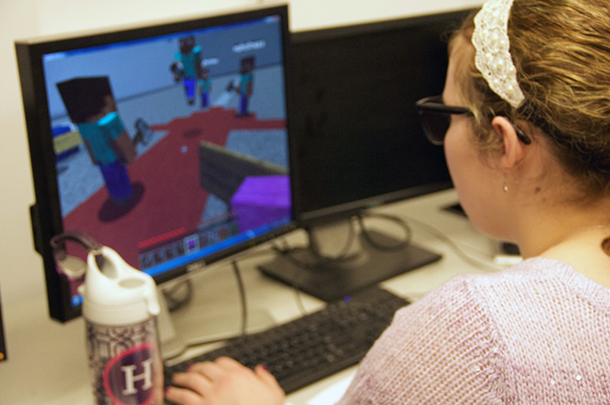Is 3-D printing the future for ceramics?
B. Reeja Jayan has been awarded the NSF CAREER Award and $500,000 to pursue research in creating 3-D printing ceramics, and create an integrated research and game-based education plan.
The Department of Mechanical Engineering’s (MechE) B. Reeja Jayan is no stranger to accolades; she’s received awards from the Army Research Office and the Air Force Office of Scientific Research and was named one of Pittsburgh Magazine’s 2017 40 under 40 honorees. Now she has once again been recognized for innovations in materials processing as a recipient of the 2018 National Science Foundation (NSF) Faculty Early Career Development Program (CAREER) Award.

Source: B. Reeja Jayan
A graduate student explores the Minecraft classroom in a "Materials and Their Processing for Mechanical Engineers" lecture.
The award, including $500,000 in research funding, is bestowed upon a faculty member in the early stages of their career with a proven potential to be both a leader in their field, and to integrate their research into novel educational opportunities. The focus of her most recent work will be researching how electromagnetic (EM) waves may be used to alter the structure within ceramic materials, potentially enabling the 3-D printing of ceramics.
The development of ceramic 3-D printing has lagged behind that of other materials, such as polymers or metals. Traditional ceramic manufacturing uses large amounts of energy, often requiring materials to be heated at extremely high temperatures. Jayan, however, hopes to instead use EM waves (such as the microwaves we use to heat our food) to induce changes within ceramics at the structural level. If successful, she could potentially be able to achieve the same quality of results as current manufacturing methods—at a fraction of the energy cost.
The practical applications created by the possibility of this novel manufacturing process are as significant as they are varied. 3-D printed ceramic parts could find use in sustainable infrastructure, transportation, clean energy, water management, aerospace engineering, and healthcare. By combining research in the fields of electrical and computer engineering, electromagnetics, materials science, mechanical engineering, and chemical engineering, the process Jayan is developing could provide a low-energy means to meet these industries’ demands for lightweight, high-strength materials.
The focus of the CAREER Award is not only to continue producing breakthrough research, but also to integrate this research into an educational setting. In the past, Jayan has received media attention for being among the first to fully integrate the popular open-world game, Minecraft, into a university-level engineering course. She plans to continue using “builder’s games” like Minecraft to teach students how building (a.k.a. processing) can change the way materials assemble (their structure) and alter the properties of the material.
Games create a higher level of student engagement and a more stimulating learning environment, reaching a broader spectrum of learners in the classroom.
B. Reeja Jayan, Assistant Professor, Mechanical Engineering, Carnegie Mellon University
“Games create a higher level of student engagement and a more stimulating learning environment, reaching a broader spectrum of learners in the classroom.” Says Jayan, “this helps address the challenge of cultivating a diverse and highly skilled workforce in manufacturing in the United States.”
Ultimately, the myriad of benefits Jayan’s research enables, both for engineering students and the various industries in which 3-D printed ceramics could see use, holds great promise for the future of industrial ceramic manufacturing.
